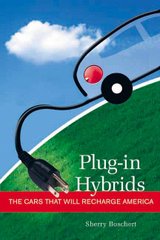The Detroit News has the alternative fuel breakdown in the president's budget request, and it isn't pretty. Increases for hydrogen fuel cell research from $289 million in FY 2007 to $309 million in FY 2008. "Automakers already have begun lobbying for the Bush Administration and Congress to support further research funding after the $1.2 billion program expires next year." I guess that wasn't enough to actually make a marketable, economic car. (Could of had 28,571 RAV4 EVs @$42,000 for the same $1.2 billion.)
The automakers wanted a new $500 million pot for battery research. Bush proposes $81 million, which includes $17 million for plug-in hybrid battery grants.
Honestly, much as I want the federal and state efforts to move toward batteries and electricity, we don't really need pure "research." We need cars. Plug-in hybrids and electric cars built with the best possible, most economic, available-now technology. I say take the proposed $390 million in Bush's budget, and give 75,000 people a $5000 grant for the purchase of a plug-in hybrid or electric car. And use the $15 million left over to educate Americans on why it is in their personal and the national security interest to buy a plug-in car.
Enough fooling around already with fuel cell fantasies such as the three profiled in AutoBlogGreen's recent post on Ford's FC concept cars. The downsides of fuel cell technology is evident in this straight forward, sympathetic reporting on these concept cars. Regarding the FC Focus and FC Explorer: "key-on, wait 15 seconds for the stack to power up, put it in drive and off you go." $1.2 billion of our money and you wait 15 seconds? Alas, they've found way around that problem with the Edge. "Because the FC Edge runs primarily off the battery, as long as there is some charge, there is no waiting." (Wow! Just like my Ford Th!nk City confiscated in 2004! ) Another shortcoming I really don't understand: The FC Edge "doesn't maximize the amount of regen available, [but] it does eliminate the problem of blending regen with friction braking." (My 2002 Toyota RAV4 EV blends regen and friction just fine, thank you. As did most if not all of the electric cars produced in the '90s.)
With all sorts of fuel cell double-talk and hydrogen hype, our policies and tax dollars have been led astray and flushed away. But technology ultimately brings us back to what is actually possible, out of what Toyota FC guru Bill Reinert calls "Disneyland" in the film Who Killed the Electric Car? The attempt to make fuel cells viable so energy companies have a fuel to sell passes through batteries. Sooner or later, maybe a journalist covering the auto beat will ask why we don't just cut out the middle man and let folks plug in.
Monday, February 5, 2007
Subscribe to:
Comments (Atom)


